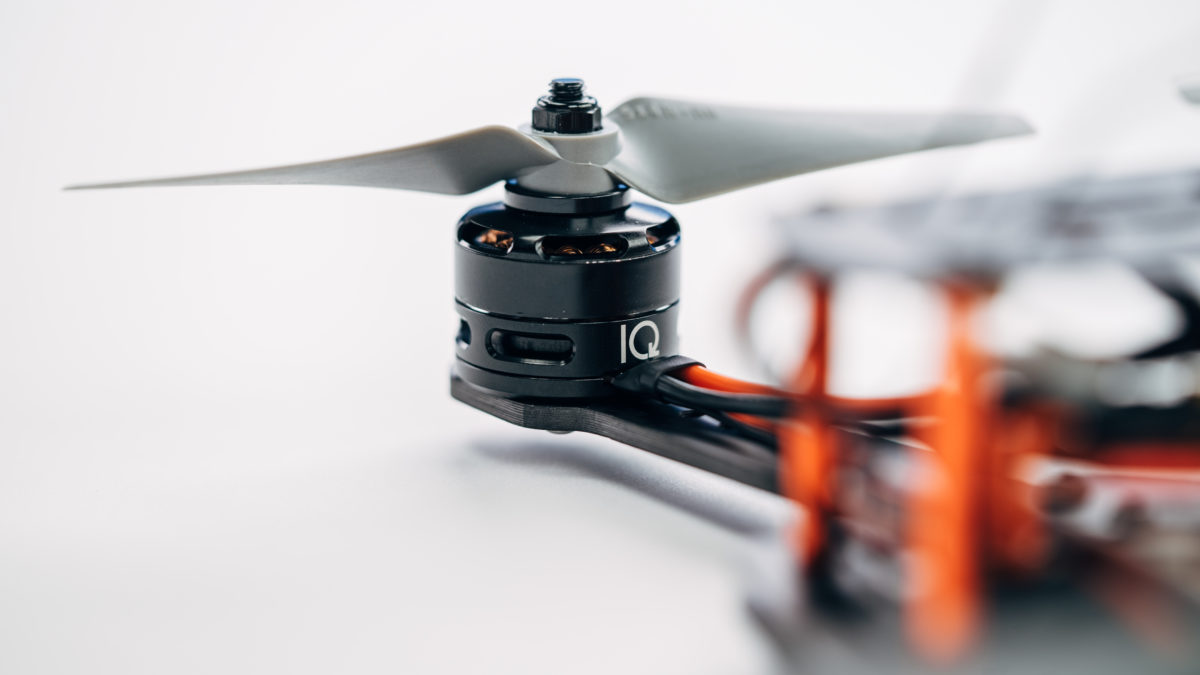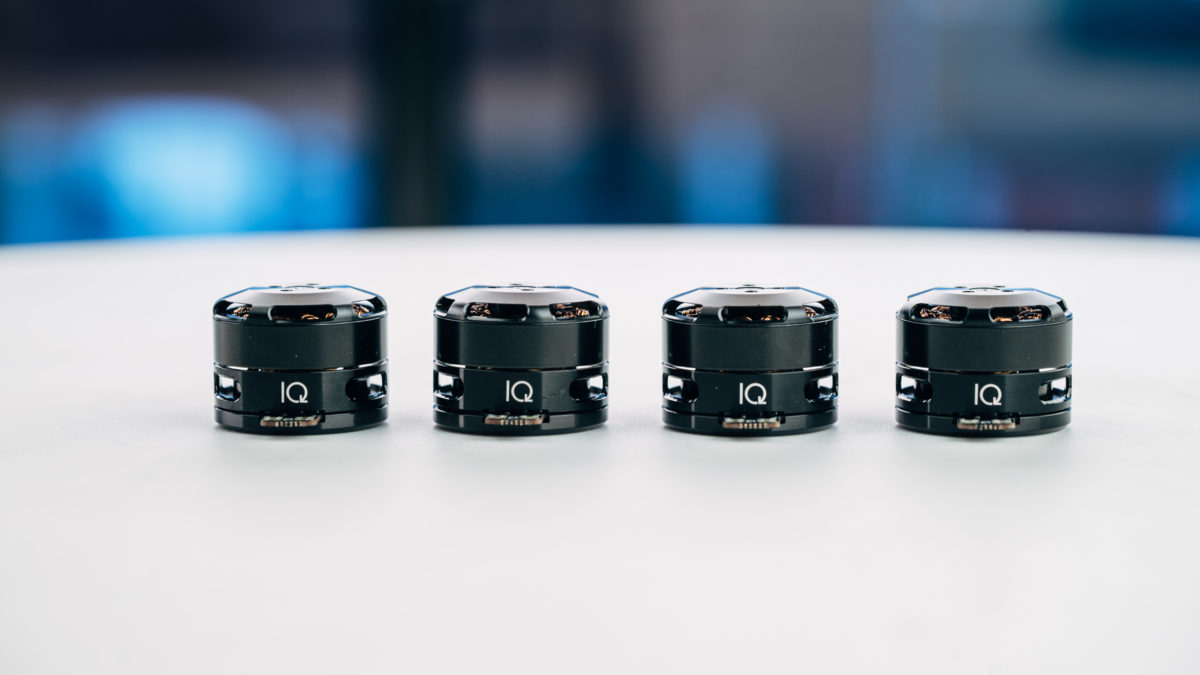In January 2017, we founded IQ Motion Control with the goal of turning a Ph.D. project from the University of Pennsylvania’s GRASP Lab into a revolutionary commercial product. We could never have predicted that our business would take us all over the country and to the other side of the world, but now that we have a year under our belt, we would love to share the lessons we’ve learned along the way as a hardware startup.
Before doing that, it may be useful to understand more about our product and background. At IQ, we make smart electric motors and controllers for drones, robotic arms, 3D printers and other robotic devices. By embedding a position sensor in our motor and reading its orientation as it spins, we have a stark advantage over standard motor technology. With this position information and our calibration and control algorithms, we’re able to optimize motor performance and give users the utmost control over their machines.
Upon starting the company, we spent the first six months refining the software, getting prototypes in the hands of users and creating features to address their needs. Progress was slow and steady, but we had paying customers.
Our big break came in August when we were accepted into HAX, a four-month hardware accelerator based in Shenzhen, China. During the program, teams were given engineering and design support, as well as mentorship on business strategy. However, the biggest advantage to HAX was its location.
It was only after arriving in Shenzhen that we realized the importance of the Chinese ecosystem for hardware companies.
Here are the top three things we learned from our time in China:
1. Expect faster prototyping
The HAX office in Shenzhen is located in an area called Huaqiangbei, which is home to one of the largest electronics markets in the world and is known as the “Silicon Valley of hardware.” The first floor of our office building had hundreds of vendors acting as storefronts for component suppliers and manufacturers all over China. We could literally walk downstairs and buy anything from integrated circuits to capacitors to LEDs, as long as we were willing to look hard enough and negotiate prices.
[googlemaps https://www.google.com/maps/embed?pb=!1m18!1m12!1m3!1d943348.4798862202!2d113.52673528518284!3d22.54335841316374!2m3!1f0!2f0!3f0!3m2!1i1024!2i768!4f13.1!3m3!1m2!1s0x3403f437b1835c39%3A0xa312c0a9f02af1ce!2sHuaqiang+North%2C+Futian%2C+Shenzhen%2C+Guangdong%2C+China%2C+518000!5e0!3m2!1sen!2sus!4v1520612448397&w=300&h=150]
Rumor has it that the selection of electronic components is so extensive that a motivated maker could replicate an iPhone piece by piece if he or she knew where to look. The lazier individuals among us might prefer to just buy a knock-off phone at one of the many “Apple” stores in the market.
With these resources so readily available, hardware companies are able to build, test, and iterate on prototypes extremely quickly. For us, this meant we were able to test a variety of components for our circuit boards, swap out different magnets within the motor and build test jigs and demo boxes relatively quickly. If a component broke during testing, we could just go downstairs and get another one.
Processes that took weeks in the U.S. only took a few days in Shenzhen and cost half as much.
As a result, we progressed much faster than we could have in Philadelphia, and we were able to move on to the manufacturing phase much earlier than anticipated.
2. Meet with manufacturers face to face
We finalized the design of our motor in late October, giving us a month and a half to get samples in before Asia Demo Day, which marked the end of the program. As the name suggests, Demo Day was the time for us and our fellow HAX teams to show off our products and pitch to investors. It was vital for us to have our sample motors spinning by then.
Our motor manufacturer told us it takes about three weeks to churn out samples after receiving the design, so when we sent them the design in the first week of November, we were confident that we’d meet the Demo Day deadline with time to spare. However, that confidence dissipated within a week or two. The engineers in charge of our project seemed to review the motor design part by part, rather than holistically. So, they would send us an email with a suggested design change, and we’d exchange several emails to resolve the problem. Then they’d come to us with another issue and that process would repeat itself. After two weeks of painstaking email correspondence, we decided to set up an in-person meeting to resolve all the problems at once.
In late November, we travelled to our manufacturer’s facilities and met with the engineer in charge of the production of our motor. Visiting the manufacturer forced them to thoroughly review the design and come up with a plan to make it manufacturable. It took about 15 minutes to discuss the remaining changes to finalize the design, a process that would have taken another two weeks over email.
We clearly underestimated the importance of visiting the manufacturer early in the production process, and it cost us precious time. Luckily, we received our sample motors the morning of Demo Day, and we now know to visit the manufacturer within a week or two of sending them designs for all future products.
3. Embrace the ecosystem
Our first month in China was difficult. The language barrier and cultural differences were apparent from the moment we arrived, and we initially wondered how we could ever be more productive in Shenzhen than in Philly.
The HAX staff encouraged us to embrace the Shenzhen ecosystem no matter how frustrating or intimidating it might be because it would pay off in the long run. The best example of this was learning to navigate Taobao, an online store similar to Amazon. Taobao had everything that we could not find in the Huaqiangbei market, but there was a major problem: the site is entirely in Chinese and no online translator could reliably translate the characters into proper English. We spent many hours on Taobao trying to decipher the actual meaning of each character. This was terribly inefficient and irritating at first, but by the time the program ended, we understood at least a hundred different characters (like motor, magnet, screw, propeller, etc.) and could navigate the site as if it were in English.
We were fortunate enough to have people around us who could help in the beginning.
Company outing to the Great Wall! pic.twitter.com/p1ZRan0KHF
— Vertiq (@vertiq_) November 27, 2017
A few teams from prior HAX cohorts still operated out of Shenzhen, including fellow UPenn companies Wazer and Lilu. They could relate to the initial struggle and offer better advice in certain situations. Without their support and HAX’s guidance, it would have been hard to know where to begin, let alone have the confidence that embracing the China-way would be worth it down the road.
Conclusion
Today’s hardware startups will almost certainly have to establish a presence in China, whether it’s during the prototyping or manufacturing phase. Programs like HAX can introduce companies to the ecosystem, but like anything else, it is up to the company to make the most of the opportunity.
We definitely benefited from our time in Shenzhen, and now we are excited to announce that we are launching our motors through Crowd Supply, which is essentially Kickstarter geared towards engineers and makers.
Support by May 10We still have a lot to learn, but if you are an entrepreneur starting a hardware company or just interested in startups, we hope our experience can give you an idea of what it’s like to work in China.
Join our growing Slack community
Join 5,000 tech professionals and entrepreneurs in our community Slack today!
Donate to the Journalism Fund
Your support powers our independent journalism. Unlike most business-media outlets, we don’t have a paywall. Instead, we count on your personal and organizational contributions.

Comcast introduces ultra-low lag Xfinity internet that boosts experiences with Meta, NVIDIA and Valve

This Week in Jobs: Add these 26 tech career opportunities to your vision board

Enough with the panels and presentations, tech leader says: Philly’s life sciences community can’t thrive without informal meetups


